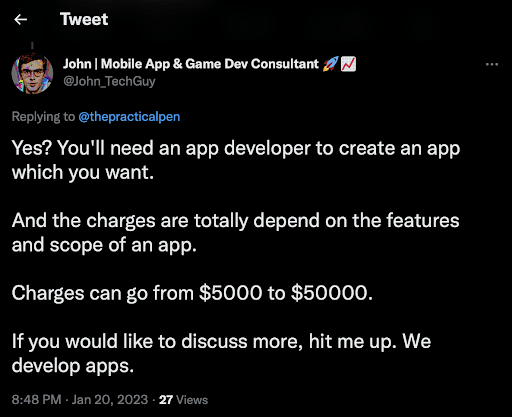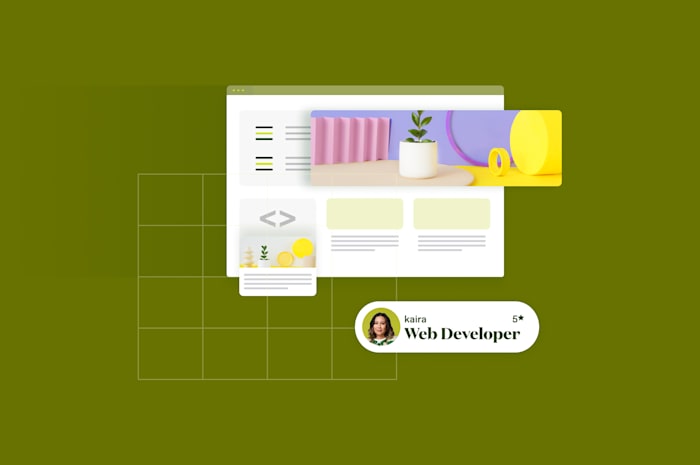How to Find an App Developer: 2024 Step-by-step Guide for SMBs
Looking for an app developer? Here’s how to sift through the stack to find the best one for your project needs and spin up a dev dream team.
 February 5, 2023
February 5, 2023 21 minute reading
21 minute reading
Mobile apps are in demand.
In 2022, consumers downloaded 255 billion apps (485,000 per minute), spent an average of $4.86 on mobile apps per device (generating $65 billion for app stores), and increased their average app usage time to five hours per day.
Those are hard numbers for brands to ignore — which is why nearly half of ecommerce businesses already have an app while 27% intend to build one to support future growth.
This scramble for a piece of the app market pie fuels the increasing demand for app development talent.
Before you dive head first to recruit talented app developers for your business, it’s worth knowing the basics.
Let’s review how to find an app developer, the benefits, costs, and everything in between so you can build out your app and boost your brand.
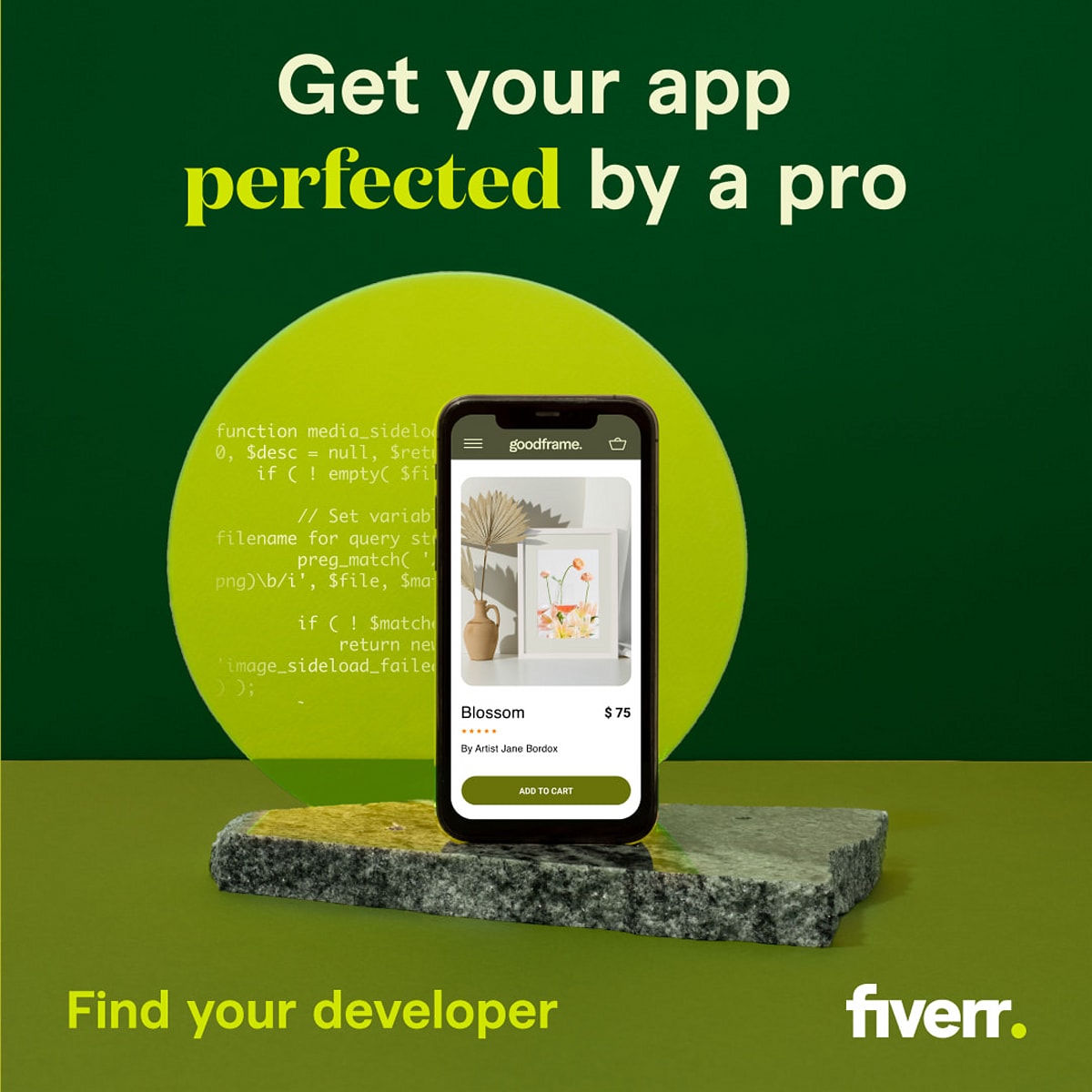
Need to get your application developed or improved? Hire a pro app developer on Fiverr today.
Hire nowWhat is an app developer?
An app developer is a software engineer who designs, creates, tests, and maintains computer programs or applications (apps).
Like web developers, app developers write software to create high-quality, user-facing apps. However, web devs build products on web technologies that run in browsers, while app devs use various programming languages to create a more natural and consistent experience within an operating system.
But what exactly should you hire an app developer to do?
“I often hire app developers to develop new features, fix bugs, re-factor the existing codebase, or build prototypes quickly before engaging in a more permanent solution,” says Lucjan Suski, CEO and Co-Founder at Surfer.
Depending on the project requirements, an app developer’s responsibilities run the gamut from general to specific duties, such as:
Writing code that meets project specifications.
Testing (manual and automated) apps to ensure they work properly and fix any bugs.
Debugging running applications to prevent downtime and track and fix errors that may cause malfunction.
Collaborating on projects with designers, project managers, quality assurance analysts, and other team members.
Tracking the project’s progress and regularly updating the client on its status.
Performing full-stack development.
Applying to app stores using specific guidelines to ensure the app meets all the requirements, and providing support and updates.
Managing projects and client communications from start to finish.
Types of app developers
Not all app developers focus on the same projects. Many of their responsibilities overlap with other types of developers.
Here’s a breakdown of the major app development categories to help you determine the right one for your project:
Software development: Handles backend coding for office productivity suites, security programs, or data management and other types of software with some focus on end users.
Mobile app development: Writes code for mobile applications and operating systems like iOS and Android, but can specialize in a specific mobile OS.
Web app development: Works on web application development, such as Microsoft 365 or Google Apps for Work, which are delivered from web servers to browser-based tools.
Desktop app development: Works with desktop computer operating systems like Mac, Windows, Linux, and more, but can specialize in one specific OS.
Hybrid app development: Develops cross-platform apps or progressive web apps — such as Twitter Lite, My BMW app, or Untappd — which work and feel like apps, without the cost and complexity of native development.
Embedded systems app development: Designs and implements software for embedded systems, like card swipe machines, medical appliances, traffic control systems, and more.
How much does it cost to build an app?
Now that you’ve started thinking about the type of app developer you need, you’re probably wondering, “what does it cost to build an app?”
A typical app development project involves several stages, each priced differently based on the type of app, your business needs, timeframe, features, platform, and other factors.
The key stages are:
Product strategy: Conduct thorough, in-depth research of your industry, market landscape, competitor analysis, and audience to determine the app you want to create and for whom (target audience).
Design and user testing: Design or develop the app’s frontend — wireframes, interface with the user experience (UX), your brand, and app strategy — and conduct compatibility testing.
Development: Code and develop the app’s backend.
Deployment: Launch the app and submit it to marketplace/app stores.
Analytics: Gather and analyze UX data for your app.
Maintenance and improvements: Update/add/edit whatever is needed in the app to suit users’ needs.
App development costs can also vary depending on who’s building it: a freelance developer, in-house developer, or app development company.

Basic Package of app development service provided by apps_zone
In houseapp developer costs
According to The Bureau of Labor Statistics (BLS), the median pay for software developers was $109,020 per year, or $52.41 per hour, as of 2021 — which is an indicator of what a freelance or in-house developer would ask for.
Zippia’s Software Salary survey shows that entry-level developers earn at least $30 to $40 per hour, or $67,000 per year. The cost also varies by industry. For instance, the tech industry pays an average of $93,297 while finance pays $96,138 annually — which works out to about $44 to $47 per hour.
App development agency costs
Nashville-based app development agency, Twin Sun, charges a standard $175 hourly rate for their design and development services and a ballpark range for mobile and freelance website apps.
“For a minimum viable product (MVP), our typical cost is $60,000 to $80,000 for a mobile and web app," says Dave Lane, Chief Software Officer at Twin Sun. “To reach a fully polished mobile and web app experience with a long feature list, you're probably going to see numbers upward of $150,000.”
Most agencies with app development teams allow you to negotiate the standard rate and may offer discounts for equity or for a larger project commitment that will keep their team busy for more than 6 months.
Lane feels many companies overlook ongoing maintenance and support costs for the apps they build.
“Beyond your initial cost, you're going to want to have a developer available for bug fixes, assistance with end user support requests, and operating system updates,” says Lane. “Apple and Google each release a major OS update annually, and release significant design guideline updates every two years. Those things require development work, probably on the order of at least a few thousand dollars annually.
What factors effect app development costs?
Depending on the size and scope of your app, there are plenty of other costs — beyond design and development — to factor into your app building budget, including:
Legal: To protect trademarks, copyrights, intellectual property, paperwork to launch your business (if you’re not registered) and more.
Customer support: Caters for technical support from developers to introduce new features and provide updates that patch bugs.
Server and storage: Covers hosting web server, monitoring, mobile analytics costs, and more.
Marketing: Covers market research costs, media coverage, app store optimization, influencer and viral marketing, user acquisition costs (cost-per-install and cost-per-action), and marketing (online and offline) campaign costs.
Location. Cost will vary if your mobile developers reside in Europe, India, the United States, or elsewhere. Keep in mind if a time zone difference is worth the cost reduction.
Subscription fees: Covers third-party services like email, SMS, API integrations, and push notifications.
Licenses: Caters for monthly or annual licensing fees for a number of devices. The costs vary depending on the number of technologies included in the app’s design.
Freelancer, in-house, or agency: Which one is right for your business?

Ideally, your employee roster comprises a dedicated in-house developer team committed to bringing your app vision seamlessly to life.
But you still need to juggle what to do in-house and what to outsource — and to who. The optimum hiring strategy may involve a mix of freelancers, your in-house team, and agency, depending on your budget and business needs.
Let’s review each of these three options.
Hiring a freelancer
A freelance app developer isn’t an employee of your company but is hired on contract and paid per-hour, per project, or on a retainer basis.
Pros of hiring a freelancer
Access to top-notch app developers globally
Generally charge lower rates owing to stiff market competition
Don’t require employee benefits
Waste less time as pay is based on results
More flexible schedules
Can be available around the clock and respond when needed
Often work from home or remotely online eliminating workspace costs
Are experts in narrow fields of specialization within app development
Don’t need constant training, management, or supervision
Easy to find on several digital marketplaces like Fiverr, Upwork, Toptal, Clutch, GoodFirms, Indeed, social media, and other platforms
Cons of hiring a freelancer
Less committed as they’re not permanently employed
Harder to manage freelancers from afar
May not have the exact skill set you need
Inconsistent availability and unreliable communication
Limited in resources — software, personnel, and training — for workflow optimization
No ongoing support after completing projects
“A few years ago, hiring a freelancer meant a disproportionate risk on us to complete our due diligence, besides additional complexity and risk of offshore resources,” explains Kruel. “Apps like Fiverr make finding app developers faster, easier, and much more reliable through community accountability.
Hiring in-house
Hiring an in-houseapp developer(s) to work directly for your company is a big undertaking with significant upsides and downsides.
“The ideal situation is to have your own in-house development team to build your app because they’re highly invested in its success — it's their primary job responsibility,” says Lane.
Permanent, dedicated teams build up a wealth of knowledge about the product, and having that all in-house from day one makes long-term support of your product much smoother than transitioning to an in-house team later.
Pros of in-house hiring
They're part of the company and committed to its success
They’ll prioritize your project
Are well equipped to build apps aligned with your vision and needs
You have more control and access to the developers
Reduce the risk of a breach of confidentiality or sharing company secrets
Fixed and predictable development costs
You can change scope and requirements at will
Preferable for project management and post-release support
Cons of in-house hiring
Inherent risk of lower quality and longer development cycles
May cost more because of salaries, perks, overheads, and associated costs
Longer delivery times
In-house recruitment process can take weeks or months
Hiring an agency
Your third option is to hire an app development agency. External software development companies might not offer similar benefits as an in-house team, but once you find the perfect fit, the benefits might outweigh the downsides. Entrepreneurs and startups might non need an entire team of programmers during the early stages of their business.
Pros of an agency
Access to an array of talent and expertise
Takes the load of training, managing, and supervising people
Greater accountability, confidentiality, and security
No surprise licensing costs
Offers app maintenance and support post-project
Can take on big projects
Can work with greater flexibility
Cons of an agency
Can be costlier than hiring a freelancer
May take longer to launch your app
Multiple client projects running concurrently affects their availability
Limited transparency as to who is working on the code
Doesn’t guarantee full control over the development process
When outsourcingapp developers is the best choice
While outsourcing has its risks and challenges, it gives you more opportunities for you to focus on your competitive advantage. This makes it more cost-effective than other options in the long-term.
Here’s a prime example based on Kruel’s experience that shows the cost-effectiveness of outsourcing to app developers:
“In our most recent app development project, which we completed this past December 2022, we priced each of these models when we started development and had solid requirements in our RFP (request for proposal). Some estimates were very close to what it would cost to deliver an acceptable application:”
Freelance (project-based): actual cost $65,000
In-house: estimate $280,000 = 4.3X
Agency: estimate $450,000 = 7X
If you need to build an app and your in-house team lacks the technical expertise you’re looking for, outsourcingapp developers would be ideal. Plus, your in-house resources may be overloaded with work and other priorities, resulting in shifted deadlines and increased development costs.
Outsourcing saves time and money, accelerates digital transformation in your business, and helps you keep pace with industry leaders without implementing drastic internal changes.
If you’re considering outsourcingapp developers, keep these tips in mind:
Use outsourcing as a leaner way to reduce operational costs and grow your business with less overhead.
Only outsource skills or expertise you don’t require from your in-house team.
Keep desirable work for your full-time employees.
Incorporate outsourcing as part of your company’s organizational culture as a productivity-enhancing tool.
Outsource to the right app developers — not someone who views your company as a side project.
Keep outsourced app developers in the loop about your organization’s vision, aspirations, and how you operate so they can function efficiently.
Where to find an app developer
Finding an app developer can be difficult if you don’t know where to look. Fortunately, there are several places online where you can find strong app developers for your business needs and budget.
Besides asking within your network or business circles, here are other places that could boost your search:
Fiverr: The world’s largest digital marketplace hosts fully vettedfreelance app developers from around the world with a wide range of skills and expertise to help you build a custom app for your brand.
Tech blogs: Top blogs in the tech space have helpful content on app development that can point you in the right direction in your search for an app developer.
Social media: LinkedIn, Facebook, Discord, and other social platforms also provide quick ways to connect with potential app developers for your project.
Creative forums and developer communities: Online communities for developers and designers give you access to review their work or project samples and start a conversation about building your company app.
B2B directories: Interested in working with an app development agency? You can find some good options in B2B directories which list their information, ratings, and reviews from current/past clients.
Search engines: While you can quickly look up and find some app developer profiles via search engines like Google or Bing, you need to be careful as not all are genuine or thoroughly vetted. You’ll still have to do your due diligence before hiring one.
Learning institutions: Universities and colleges also have talented student app developers who can help with your project (sometimes in exchange for a stipend or internship opportunity).
How to find an app developer
To illustrate the search and hiring process, we’ll walk you through how to find an app developer on Fiverr.

1. Sign in or sign up to Join Fiverr as a Buyer.
2. Select your login option — via Facebook, Google, or Apple. Or enter your email address then choose a username and password to use as your login credentials.
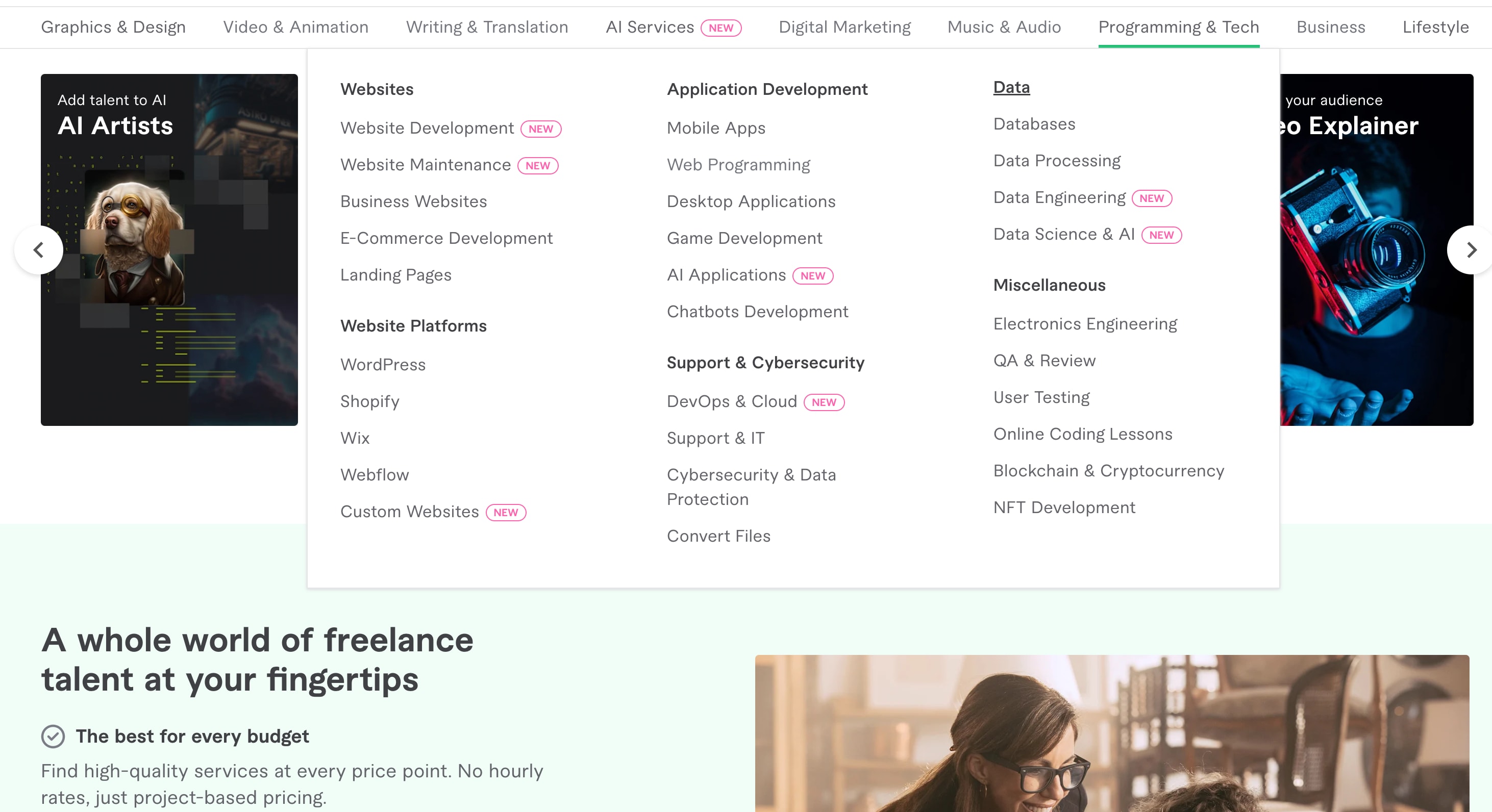
3. Next, hover your cursor over a Category, in this case Programming and Tech.
4. Pick the sub-category for which you want to find an app developer. For example, you can select Mobile app services.
5. Under the selected sub-category (we’ll use Mobile apps for illustration purposes), you’ll find several filters to narrow down your search based on:
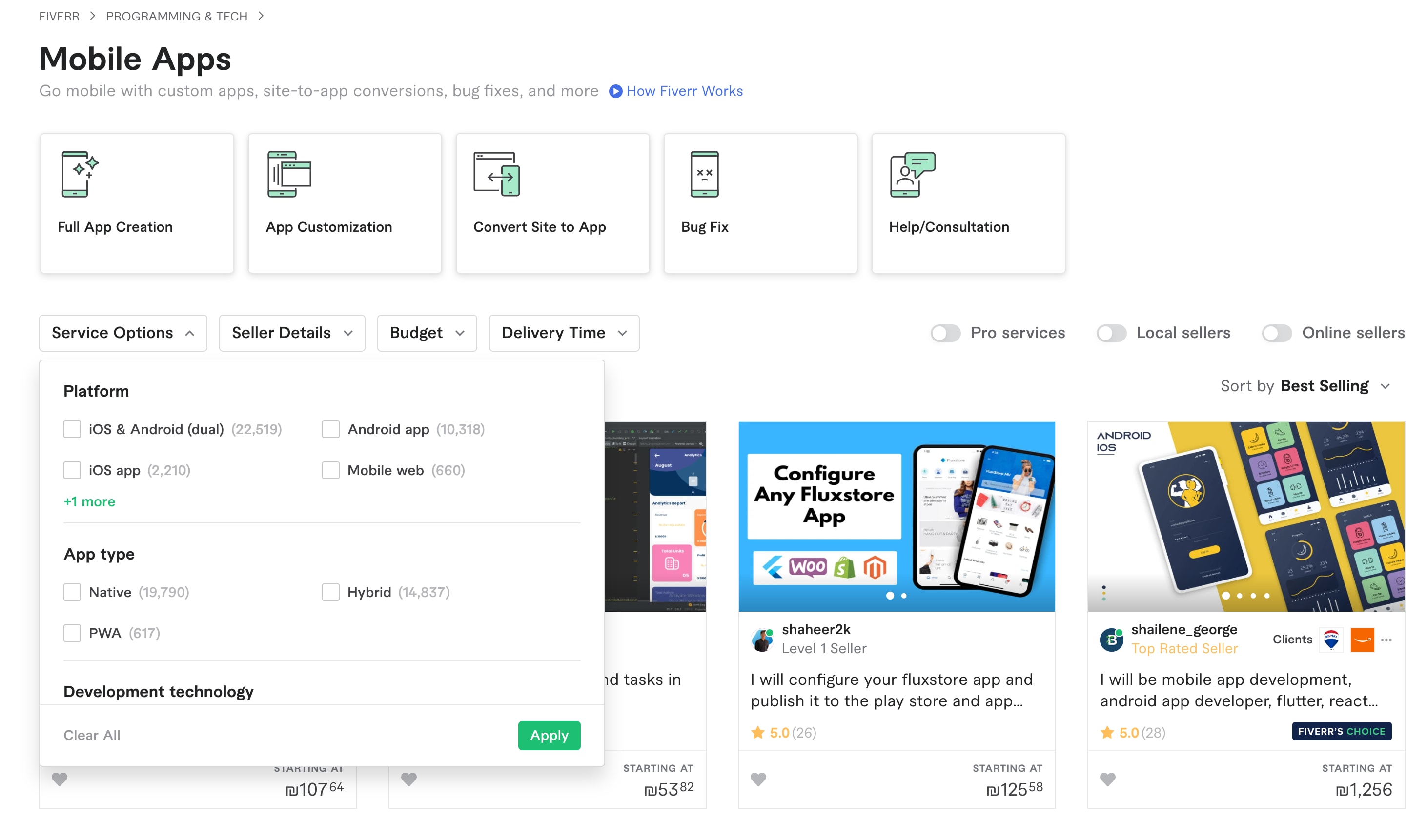
Service type: You can drill down further and choose the type of service you need, such as full app creation, customization, or bug fix.
Service options: Here you can narrow down your search further using filters like platform, app type, development technology, purpose, and expertise.
Seller details: This includes variables like the seller’s native language, nationality, and level (new seller, level 1, level 2, or top-rated).
Budget: You can search for developers within your budget range.
Delivery time: Indicate whether you want someone who can deliver within 24 hours (Express), 3 days, 7 days, or Anytime based on your needs.
6. Fiverr will display suitable matches of app developers based on your search filters. Each thumbnail display will show the seller’s name, rates, and a featured image selling their services.

7. Once you pick a few profiles, use the tabs on the profile menu to find out who the developer is, what they do, services they offer, and rates before settling on the right person.
8. You can use the Contact seller or Message (seller name) options to start a conversation and know more about the developer before placing your order.
9. If you’re happy with a particular seller and want to move forward with them, compare their rates, select a package, then select the green Continue button to place your order. (Alternatively, you can ask a seller to provide you with a custom offer based on your requirements)
10. Review your order then select Continue.
11. Enter your billing details then select the Confirm & Pay button on the bottom right side.
From here on, you can submit your requirements to the seller, such as a non-disclosure agreement (NDA) or additional documents required before they can proceed with the work. You can always track the progress of the work with your freelancer via your dashboard or other communication channels you agree on.
What should you look for in an app developer?
You’ve found at least one potential app developer you’re considering hiring for your project. Before you settle on the right one, be clear in your expectations of the candidates.
Once you know the type of app you want built, your business needs, and budget, get a good sense of the developers’:
Skills
Experience level
Proficiency in programming languages and app development software
Skills
Look out for app developers who possess soft skills, such as:
Problem-solving: To think logically, identify problems fast and efficiently, debug code, and provide solutions to or troubleshoot errors.
Creativity: To suggest and/or try new ideas
Communication: To ensure you’re on the same page about the project, they understand user needs, and can explain concepts clearly and concisely.
Interpersonal skills: For effective collaboration with other team members and software users.
Leadership: To motivate other team members and ensure projects are completed within the set time frame and budget.
Analytical skills: To interpret data, analyze trends and understand user needs so as to develop the right, most effective solution or approach.
Time management: To meet deadlines and handle projects in the right order.
Positive attitude and strong work ethic: An app developer with passion for keeping up-to-date with trends, learning new technologies, and working hard helps them stay competitive in the industry.
Check also for job-specific skills based on:
Platform: Can they work with operating systems like Windows, Mac, or Linux? Are they an iOS or Androidapp developer, or both?
Device: Are they versatile enough to design and develop apps for multiple devices, such as mobile or hand-held phones, computers, point-of-sale systems, and more?
Domain: What domains have they developed and deployed app services for?
Experience level
Ideally, an app developer should have an educational background in computer science or a related field. Most app developer roles require a minimum of a bachelor’s degree, but some companies will ask for a master’s degree or higher.
Other than their knowledge background, assess app developers based on hard skills — technical ability and knowledge to design, develop, and deploy apps. These include:
Coding: Find out if they write efficient and accurate instructions using programming languages when creating software apps.
Database management: Check how they create and manage databases to store user and app data. A good app developer will also have knowledge and experience of different database management systems, structures, and query languages.
User experience (UX) and user interface (UI) design, software testing, version control, and development operations (DevOps): Check if the developer can create a graphical UI of your app, intuitive user experience, track changes to code, and automate software development processes.
Programming language and app development software

Ask the developer to show proof of experience working in common programming languages or app development software, such as:
Java
C++
JavaScript
Node.js
PHP
CSS3
Flutter
HTML5
Ruby
Django
Kotlin
“The app developer should also have a strong background in the programming languages and frameworks relevant to the project, such as Swift, or React Native, plus experience with development tools such as Xcode, Android Studio, and Git,” says Rahul Vij, CEO at WebSpero Solutions.
Once you cover all the bases, write a clear and concise job posting, complete with the relevant details that potential app developers need to know.
Tips to find a good app developer
Good app developers are hard to find, but here are a few tips to help with your search.
Screen each developer’s portfolio
Check platforms like Stack Overflow, GitHub, and other developer forums to read over the projects they’ve done and clients they’ve worked with, to determine if they’re a good fit. If you need an IOS app or a native app, make sure their portfolio demonstrates relevant expertise. Ask what work they’re proud of that may be relevant to your needs.
Ask for testimonials or case studies of their past or current work (if possible)
Check reviews from clients, certifications, and any awards they’ve received. This gives you the social proof you need to hire them and shows you their efficacy to work on your project.
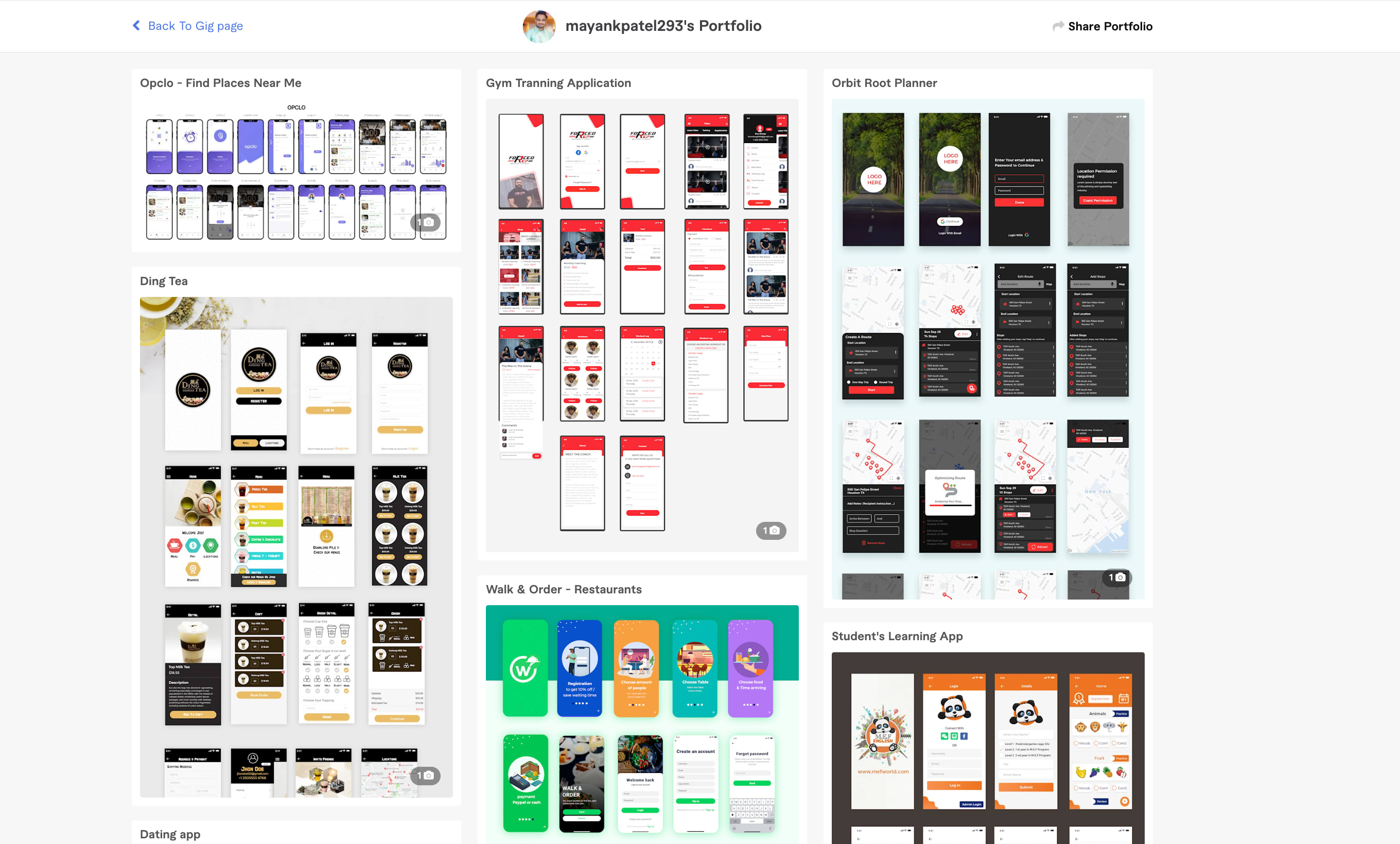
Web app development portfolio by mayankpatel293
Web app development portfolio by mayankpatel293
“Expertise ranges widely in the field, so my first priority is to find someone with a solid portfolio and trusted references. I want to hear about other businesses’ experiences and whether the developer can deliver a quality product on time and won’t string us along for months with unnecessary delays,” says Jack Underwood, CEO & Co-Founder of Circuit.
Conduct an interview through a screening questionnaire or video conference call
Use a screening questionnaire or video conference call to interview app developers you're considering to hire for your project. This helps you determine the developer’s skills, programming languages they know and use, their methodology or style, development technology they recommend, delivery timelines, and more.
Do a pilot project
This helps you identify the developer’s skills and knowledge, how they work, and evaluate how they think and handle abstract projects or tasks, especially those similar to your project.
"We always start the relationship with a paid test project to make sure both sides like working together,” says Alex Kracov, CEO and co-founder of Dock. “During this trial project, we're evaluating code quality, speed of feature development, and communication skills. We want to understand if developers know when to ask for help and if they think critically about the features they build.”
What to do before finding app developers
Before hiring any developer you find that might nickel and dime you without delivering to your specifications, plan out the following important steps:
Market research: Deeply research your market to know the current offerings, the competitors’ strategy, strengths and weaknesses, their unique selling point, and customer reviews. That way, you’ll discover gaps in the market and/or whether your project is viable.
Product idea validation: Articulate your app’s purpose, specific use cases, key functionality, problems it solves, and difference from your site. That way you won’t waste resources on the wrong target group or redundant features.
Target audience: Define the potential users of your app, what they need and crave, why they’d want to use your app, and how they’ll benefit from it.
Type of app: Decide whether you’ll use a native, web, or hybrid app. It’s easier to allocate your resources and plan your web or mobile app development project when you make this technical decision early on as it affects development and maintenance. If you know you need an IOS app, then you only need to look for IOS developers.
Document brief (app idea design): Create a functional specification document and user flow diagram. That way, it’s easier to align your objectives and expectations, and ensure the plan is ready for execution by the time you reach the development phase.
Platform and app language: Identify the platforms you want to develop, languages you’re already familiar with and those that will suit your needs and purposes.
Marketing strategy: Build your marketing strategy and pre-launch buzz to help you prepare to market and amplify the app. Thai includes branding, media and PR outreach, pre-launch efforts, and more for easier promotion when you’re ready to launch your app.
App store optimization: Plan out how people will discover your app in app stores. Keep in mind app store best practices and requirements. Identify a memorable and unique app name, icon, and relevant keywords for easier search.
Monetization options: Define the role your app will play in your business model and decide on monetization models such as freemium, paid, in-app purchases, in-app ads, sponsorships, or subscriptions.
Project budget: Know what resources you’re working with early on so you can plan for each development phase and its needs, and prevent emergencies down the line.
Find the ideal app dev for your project
Each app development project is different. So it’s important to make the best possible decision about who will design and develop yours.
Fiverr gives you access to the best app developers from across the world, with varied expertise, skills, and budget options so you can spin up a dev dream team. Plus, it makes finding, hiring, and paying a developer simple.
Sign up to find and hire top-rated app developers for your project.
